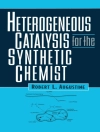New strategies and techniques for today’s fast-paced discovery
process
Today, the pressure is on for high-throughput approaches to
accelerate the generation, identification, and optimization of
molecules with desirable drug properties. As traditional methods of
analysis become antiquated, new analytical strategies and
techniques are necessary to meet sample throughput requirements and
manpower constraints. Among them, mass spectrometry has grown to be
a front-line tool throughout drug discovery.
Integrated Strategies for Drug Discovery Using Mass Spectrometry
provides a thorough review of current analytical approaches,
industry practices, and strategies in drug discovery. The topics
represent current industry benchmarks in specific drug discovery
activities that deal with proteomics, biomarker discovery,
metabonomic approaches for toxicity screening, lead identification,
compound libraries, quantitative bioanalytical support,
biotransformation, reactive metabolite characterization, lead
optimization, pharmaceutical property profiling, sample preparation
strategies, and automation.
THIS BOOK:
* Clearly explains how drug discovery and mass spectrometry are
interconnected
* Discusses the uses and limitations of various types of mass
spectrometry in various aspects of drug discovery
* Prominently features analytical applications that require
trace-mixture analysis
* Provides industry applications and real-world examples
* Shares historical background information on various techniques to
aid in the understanding of how and why new methods are now being
employed to analyze samples
表中的内容
Preface.
List of Contributors.
Acknowledgements.
1. Miniaturized Formats for Efficient Liquid Chromatography Mass
Spectrometry-Based Proteomics and Therapeutic Development. (Gary A.
Valaskovic and Neil L. Kelleher).
2. Mass-Spectrometry-Based Drug Screening Assays for Early
Phases in Drug Discovery. (Marshall M. Siegel).
3. ESI-FTICR as a High Throughput Drug Discovery Platform.
(Kristin A. Sannes-Lowery, Lendell L. Cummins, Shuo Chen, Jared J.
Drader, and Steven A. Hofstadler).
4. Mass Spectrometry- Based Proteomic Approaches for Disease
Diagnosis and Biomarker Discovery. (Thomas P. Conrads, Haleem J.
Issaq, Josi S. Blonder, and Timothy D. Veenstra).
5. Metabonomic Applications in Toxicity Screening and Disease
Diagnosis. (John P. Shockcor and Elaine Holmes).
6. The Central Role of Mass Spectrometry in Natural Products
Discovery. (Jeffrey R. Gilbert, Paul Lewer, Dennis O. Duebelbeis,
Andrew W. Carr).
7. Application of Mass Spectrometry to Compound Library
Generation, Analysis, and Management. (Xueheng Cheng and Jill
Hochlowski).
8. A Combinatorial Process for Drug Discovery. (David S. Wagner,
Richard W. Wagner, Frank Schoenen, and H. Mario Geysen).
9. Application of Technological Advances in Biotransformation
Studies. (Carmen L. Fernàndez-Metzler, Raju Subramanian and
Richard C. King).
10. Applications of Mass Spectrometry for the Characterization
of Reactive Metabolites of Drugs in Discovery. (Jim Wang, Jack
Wang, Margaret Davis, William De Maio, Jo Ann Scatina, and Rasmy
Talaat).
11. Advances in High Throughput Quantitative Drug Discovery
Bioanalysis. (Bradley L. Ackermann, Michael J. Berna, and Anthony
T. Murphy).
12. New Strategies for the Implementation and Support of
Bioanalysis in a Drug Metabolism Environment. (Walter A.
Korfmacher).
13. An Integrated LC-MS Strategy for Preclinical Candidate
Optimization. (Jonathan L. Josephs and Mark Sanders).
14. New Approaches for Method Development and Purification in
Lead Optimization. (Yining Zhao and David J. Semin).
15. High Throughput Metabolic and Physicochemical Property
Analysis: Strategies and Tactics for Impact on Drug Discovery
Success. (Edward H. Kerns and Li Di).
16. Organ Perfusion and Mass Spectrometry. (C. Gerald Curtis,
Ben Chien, David Bar-Or, and Kumar Ramu).
17. Sample Preparation for Drug Discovery Bioanalysis.(David A.
Wells).
18. Automation. (John D. Laycock and Thomas Hartmann).
Index.
关于作者
MIKE S. LEE, PHD is President of Milestone Development Services. He is actively involved with consulting, workshops, and symposia to connect industry needs with innovative technologies and solutions. His research interests include the applications of mass spectrometry for the analysis of proteins, natural products, drug metabolites, impurities, and degradants. Recent work has involved the development of automated orthogonal control systems for electrospray ionization. Formerly, Dr. Lee was director of analytical research and development at Bristol-Myers Squibb (BMS) Pharmaceutical Research Institute where he led interdisciplinary teams that contributed to the Food and Drug Administration’s approval of Buspar® and Serzone, and the accelerated development and approval of TAXOL. Dr. Lee is a member of the American Society of Mass Spectrometry, American Association of Pharmaceutical Scientists, and the American Chemical Society. In addition, he has authored over forty scientific papers and issued patents.












